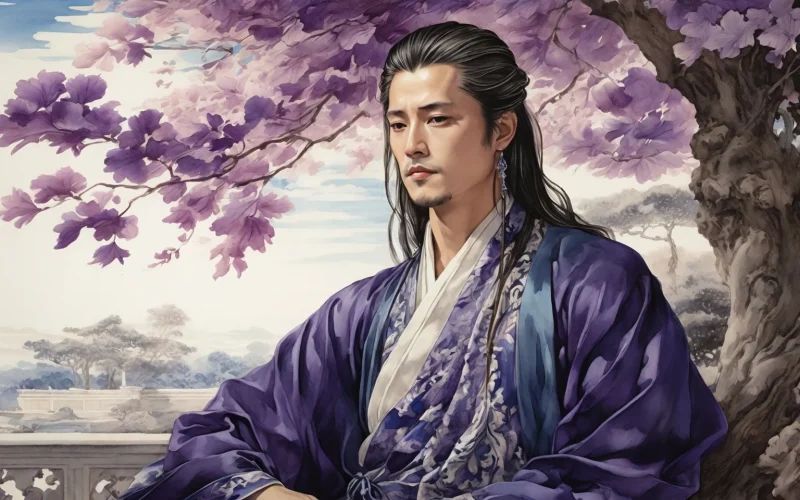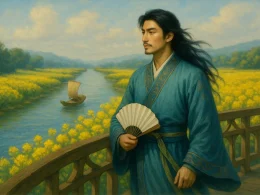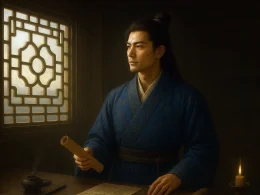Yan Shu (晏殊, 991 – 1055), a native of Linchuan, Fuzhou (present-day Fuzhou, Jiangxi Province), was the founding master of the Wanyue School of lyric poetry (ci) in the Northern Song Dynasty. Recognized as a child prodigy, he entered official service at the age of fourteen and rose to the positions of Grand Academician of the Jixian Hall and Military Commissioner, posthumously honored with the title "Yuanxian." His ci poetry, collected in Pearl and Jade Lyrics (140 surviving works), exhibits dignified elegance, subtly infusing philosophical contemplation into depictions of prosperous refinement. His Silk-Washing Stream ("Flowers fall despite our reluctance; Swallows return as if acquainted") embodies the sense of impermanence through natural imagery, while Butterflies in Love with Flowers ("Last night the west wind withered the green trees") was later praised by Wang Guwei as representing one of the "three realms of life." His equally exquisite poetry, such as Hidden Meaning ("Pear blossoms bathed in courtyard moonlight"), reveals his refined and leisurely disposition. As a mentor who promoted talents like Fan Zhongyan and Ouyang Xiu, he pioneered the Jiangxi School of ci poetry. Critic Wang Zhuo acclaimed his works as "gentle and exquisite, completely transcending the style of the Five Dynasties," thus establishing the foundation for the refinement of Song Dynasty ci poetry.
Major Works
Biography
Early Life
Yan Shu displayed extraordinary intelligence from childhood. Legend has it that he could compose poetry at three and master the Classic of Poetry and Book of Documents by five. His father, Yan Jian, a local official, imposed strict education on him. Even in his youth, Yan Shu gained local renown for his exceptional literary talent. At thirteen, he traveled to the capital to take the "child prodigy" examination, where the chief examiner hailed him as a "rare genius." Soon after, he was summoned to the palace for an audience with the emperor. At fourteen, he officially passed the imperial examinations, earning the jinshi degree and astonishing the court.
Despite early success, Yan Shu remained humble and dedicated to learning. He became well-versed in classics and history, and his literary reputation grew daily. Emperor Zhenzong appointed him as a proofreader in the Imperial Library, marking the beginning of his political career.
Political Career
Yan Shu served three emperors—Zhenzong, Renzong, and Yingzong—holding office for nearly forty years with outstanding achievements and earning the emperors' deep trust. He excelled in both cultural governance and administration, known for his gentle temperament, steady conduct, and ability to mediate among various court factions.
- Under Emperor Zhenzong: Yan Shu initially served as a proofreader in the Imperial Library, later holding positions such as Reminder of the Right, Drafter of Edicts, and Hanlin Academician, gradually entering the core of political power.
- Early Renzong Era: As Vice Military Commissioner and Vice Chief Councilor, Yan Shu became a key member of the ministerial team. Before radical reformers like Fan Zhongyan emerged, Yan Shu advocated gradual reform, balancing court stability. He repeatedly recommended young talents such as Fan Zhongyan, Ouyang Xiu, Yin Zhu, and Han Qi, laying the groundwork for the personnel of the Qingli Reforms.
- Yan Shu served as Chief Councilor three times, holding high-ranking positions such as Minister of Rites and Military Commissioner for extended periods. He participated in numerous major state affairs, particularly praised for his handling of border defense and talent selection.
Governance Style
Throughout his life, Yan Shu upheld the principle of "harmony and moderation." His political views were temperate and impartial. Though not known for radical reform, he possessed exceptional discernment in selecting talent. He strongly recommended Ouyang Xiu, praising him as "peerless in prose and refreshing in discourse," and steadfastly supported his entry into politics. Ouyang Xiu later described Yan Shu as "heroic in demeanor, possessing the bearing of a statesman."
In office, Yan Shu handled affairs with extreme prudence, excelling in mediating between the emperor and ministers to maintain court stability. He also demonstrated foresight in border defense, overseeing negotiations with the Western Xia and Khitan, contributing to the Song Dynasty's frontier security.
However, Yan Shu was often criticized for being "lenient and conservative," particularly when reformers like Fan Zhongyan pushed for change, where he was seen as a "moderate obstacle." Nevertheless, he consistently prioritized court stability, mediating between reformist and conservative factions, becoming a crucial figure in maintaining political equilibrium.
Later Years and Death
During the Qingli era of Emperor Renzong, Yan Shu gradually withdrew from active politics due to advanced age, assuming honorary positions. In his later years, he devoted himself to writing and poetry for personal enjoyment. He passed away in 1055 at sixty-five, posthumously honored as Grand Minister of Works and Duke of Yan, with the posthumous title "Yuanxian."
Yan Shu epitomized the archetype of "early achievement and lasting maturity"—renowned for literary talent in youth and admired for integrity and refinement in officialdom. Though his life lacked sensational exploits, he served as a stabilizing pillar at critical junctures. He represented the cultured, Confucian statesman of the early Northern Song, embodying the "scholar-official model" and symbolizing the Song Dynasty's spirit of "moderate cultural governance." Through political vicissitudes, he remained unperturbed by honor or disgrace, maintaining his position not only through talent but also through personal charm and governance characterized by gentleness and benevolence.
Literary Achievements, Poetic Style, and Representative Works
Characteristics of Ci Poetry
- Graceful and Elegant, Blending Emotion with Scene: Yan Shu's ci poetry embodies warmth, elegance, and fluency, reflecting the early Song Dynasty's emphasis on literary refinement, stylistic discipline, and restrained emotion. His themes often revolve around lamenting spring's passing and the sorrow of separation, employing exquisite diction to portray delicate inner feelings.
- Classical and Refined Language, Skilled Use of Allusion: Yan Shu's ci poetry features polished and precise language, frequently incorporating allusions from classical texts without appearing contrived. Lines like "Flowers fall despite our reluctance; Swallows return as if acquainted" demonstrate his ability to weave references naturally, creating timeless verses.
- Subtle Profundity, Founding the "Aesthetics of Melancholy": His ci poetry conveys a "composure within sorrow," distinct from the despondency of late Tang poets. Instead, it emphasizes grace, lyricism, and restraint, blending wistfulness with warmth and hope—a defining feature that became central to the Wanyue School.
Literary Accomplishments
Yan Shu was a pivotal figure in both literature and politics during the early Northern Song, renowned particularly for his ci poetry. His works, characterized by classical elegance and lingering sentiment, are linguistically exquisite and stylistically transcendent, establishing him as a foundational figure of the Wanyue School with profound influence on later generations. His ci poetry often expresses the leisurely sentiments of official life and the melancholy of farewell banquets, blending clarity with philosophical depth and subtlety with profound emotion. This marked the transition of ci poetry from folk songs to literati self-expression, earning the description "poetry within ci, reason within poetry." Stylistically, he inherited the delicate charm of Five Dynasties poets while infusing the refined temperament of scholar-officials, pioneering a new literati ci tradition. Alongside Song Qi, he was jointly known as "Yan-Song," providing an important model for later poets like Ouyang Xiu and Su Shi.
In poetry and prose, Yan Shu mastered parallel prose and regulated verse. His poetic style is polished and classical, often focusing on historical themes, personal reflections, and court compositions, showcasing his profound erudition and command of allusion. As a high-ranking official, he oversaw the Imperial Library for years, directed state historiography, and mentored talents like Ouyang Xiu and Song Qi, leaving a lasting impact. His lines, such as "Flowers fall despite our reluctance" and "Green willows and fragrant grass line the pavilion road; Youth departs from people so easily," remain widely quoted today, serving as exemplars of Wanyue-style ci poetry and marking the Northern Song's emergence of an elegant and refreshing poetic tradition.




























